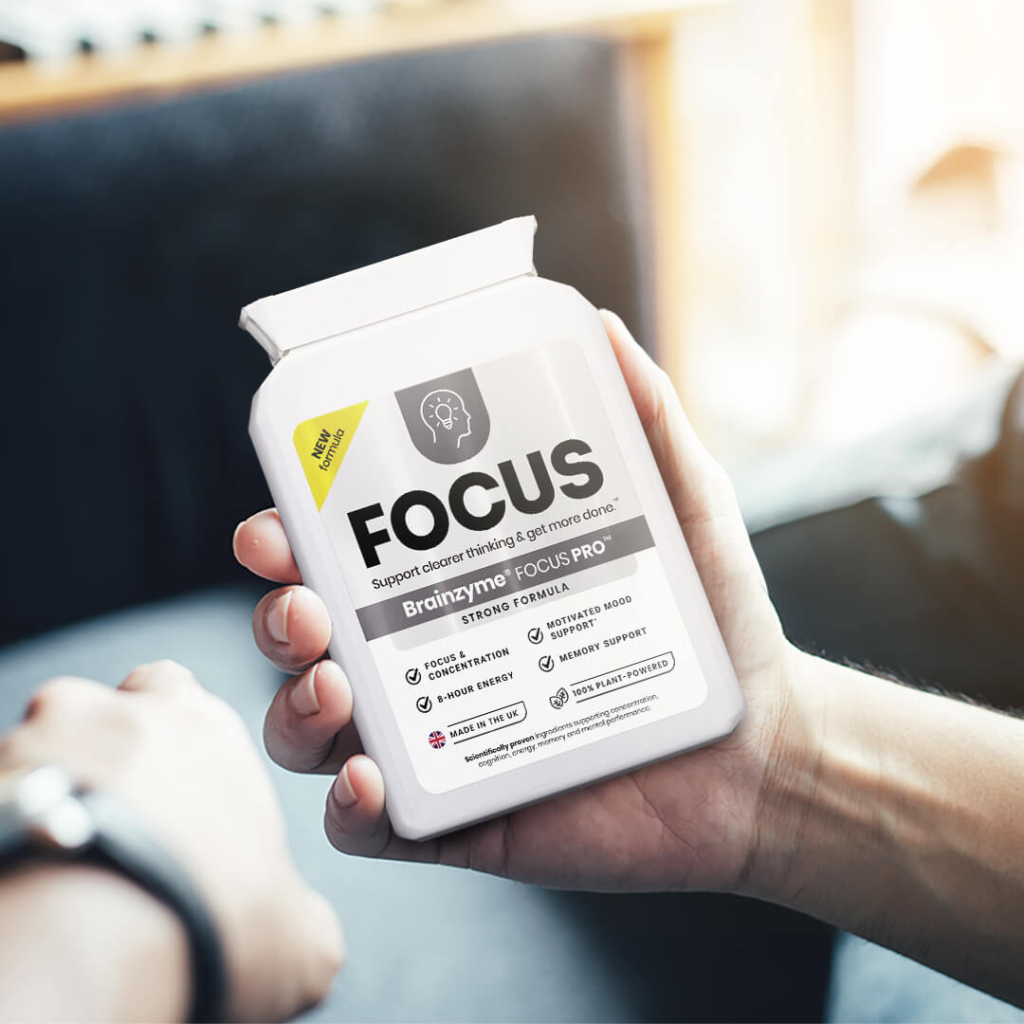Ritalin UK: An Ultimate Guide

As the demand for cognitive enhancement grows, more and more people are turning to smart pills and other nootropics to boost their mental performance and increase their productivity. These study drugs, marketed as ways to improve focus, memory, and overall cognitive function, have become increasingly popular in the UK and worldwide.
Ritalin, a stimulant medication that is only legal on prescription to treat attention deficit hyperactivity disorder (ADHD), has been increasingly used off-label as a smart pill.
In this post, we’ll provide information on what Ritalin is, where to buy Ritalin in the UK and more. We’ll also explore the potential side effects of Ritalin and how it compares to other similar medications.
Plus, we’ll tell you about a safer, natural alternative that is just as effective and made right here in the UK. Everything you need to decide whether Ritalin is the right choice for you and your cognitive enhancement needs.
This website contains affiliate links. As an affiliate, we may earn a commission when you click on these links and make a purchase or take a specific action.
Looking for the German version? Read “Ritalin Alternative: Der ultimative Ratgeber!”
Contents
- What is Ritalin and How Does It Work?
- Where Can I Buy Ritalin in the UK?
- Is Ritalin Legal in the UK?
- What Are the Potential Side Effects of Ritalin?
- Uses of Ritalin
- Ritalin vs Other ADHD Medications: What’s the Difference?
- Are There Any Natural Alternatives to Ritalin that are Equally Effective?
- Conclusion
What is Ritalin and How Does It Work?
Ritalin is the brand name for Methylphenidate, a stimulant that acts on the central nervous system. Methylphenidate was first made in 1944 and was first approved for use by adults in the 1950s.
Initially marketed as a ‘pep pill’: Ritalin is a stimulant stronger than caffeine but less intense than the then-commonplace amphetamines.
Ritalin increases the levels of certain neurotransmitters, such as dopamine and norepinephrine, in the brain. These neurotransmitters are involved in regulating attention, mood, and behaviour. Increasing their levels, Ritalin can help improve focus and attention, reduce impulsivity, and increase concentration.
Ritalin is usually taken as a tablet or capsule and is typically taken once or twice daily. The dosage and frequency of use depend on the specific needs of the individual, and a doctor or other healthcare provider typically prescribes it. It is important to follow the prescribed dosage and frequency of use, as taking too much Ritalin can lead to serious side effects and potential overdose.
Where Can I Buy Ritalin in the UK?
If you have been prescribed Ritalin by a doctor and want to purchase the medication, you must go to a pharmacy and present your prescription. The pharmacist will then dispense the medication for you. It is important to note that you cannot buy Ritalin online without a prescription, which can be illegal and potentially dangerous.
People who acquire Ritalin off-label may purchase it online from a pharmacy that does not operate under British law. These pharmacies are unregulated and might sell adulterated or substandard medication that could pose additional dangers alongside Ritalin’s usual side effects. Here are a few reasons why buying Ritalin online can be dangerous:
Quality and safety concerns: When you buy Ritalin online, you cannot know if the medication is genuine or has been properly stored and handled. Buying from an unlicensed or rogue online seller can put you at risk of getting counterfeit or contaminated medication, which can be harmful to your health.
Legal risks: Buying Ritalin online without a prescription is illegal in the UK, and you could face criminal penalties if caught. You could also be putting the seller at risk of legal consequences, as selling prescription medications without a license is illegal.
Dependence and abuse potential: Ritalin is a controlled substance with a high potential for abuse and dependence, and using it without proper medical supervision can increase the risk of developing an addiction. If you buy Ritalin online without a prescription, you may be more likely to abuse the medication and increase your risk of negative health consequences.
Is Ritalin Legal in the UK?
In the UK, Ritalin is a prescription-only medication regulated under the Misuse of Drugs Act 1971. This means that it is legal to use Ritalin in the UK, but only if it is prescribed by a doctor or other healthcare provider and used for a legitimate medical purpose.
It is illegal to possess, sell, or supply Ritalin without a prescription, and doing so can result in being punished with hefty fines or even up to 14 years in prison. It can also result in a criminal record, which can have long-term consequences for education, employment, and other areas of life.
Ritalin is classified as a Class B drug in the UK, meaning it has a high potential for abuse and dependence. As a result, it is subject to strict controls and can only be obtained with a prescription from a doctor or other healthcare provider.

While Ritalin is legal in the UK for medical purposes, concern has grown about its off-label use as a cognitive enhancer or smart pill.
Some people use Ritalin in an attempt to boost their mental performance. However, regulatory authorities do not approve of this use, and it carries significant risks.
Using Ritalin as a smart pill can be hazardous to health, and it is important to be aware of the potential risks and side effects before using the medication in this way.
Instead of attempting to buy Ritalin illegally online, safer, more affordable alternatives are available in the UK. Learn more about our recommended choice for the best natural Ritalin alternative or take advantage and save time by using a quick buy function.
What Are the Potential Side Effects of Ritalin?
Most studies on Ritalin’s side effects are carried out on patients with ADHD, narcolepsy or other disorders – they have been prescribed the medication by a doctor.
This means that these studies may not fully apply to those using Ritalin without a prescription as a smart drug.
Taking that into account, the NHS, as well as the American FDA, says that Ritalin may commonly cause:
- Increased heart rate and blood pressure
- Insomnia
- Loss of appetite
- Nervousness and agitation
- Stomach pain and nausea
- Mood swings
They also mention more serious side effects, such as:
- seizures
- problems with vision
- cardiovascular issues
- circulation problems.
Ritalin may also cause psychological problems in rare cases. Using Ritalin can trigger or worsen mental issues, primarily paranoid psychosis or hypomanic or manic symptoms. These problems are very uncommon, but it’s not an impossibility.
Because Ritalin increases dopamine in the brain, it may also be addictive when used regularly. Again, this is rare according to the vast majority of studies, but it is possible and can cause significant problems.
Long-term Effects
Finally, the long-term effects of Ritalin on healthy brains are not fully known. However, it may have some potential for addiction. Most studies seem to indicate a low chance of it happening, but as Ritalin boosts dopamine in the brain, it may be able to cause dependence or addiction. It affects your brain in a similar way to cocaine.
As mentioned, most studies on Ritalin are conducted on patients prescribed the drug rather than people using Ritalin as a nootropic for focus or a type of ‘smart drug’. Thus, research is lacking into Ritalin’s long-term impact on neurotypical brain chemistry.
Misusing Ritalin can increase the risk of experiencing these side effects and may lead to serious health problems. It can also interact with other medications and substances, including alcohol, increasing the risk of negative health consequences.
People who abuse Ritalin may experience cravings and withdrawal symptoms. These can include fatigue, depression, and difficulty concentrating.
To avoid these consequences, keep reading to find out about a natural alternative to Ritalin that is affordable, safe and has little to no side effects.
Uses of Ritalin
In the UK, the use of Ritalin has been rising. There have been numerous pieces in the media recently on increased incidences of smart drug use, which could be because of multiple factors.
The first thing to consider is that it’s become more common to be prescribed Ritalin in the first place. From 2000 to 2015, the rate of being prescribed medication to treat ADHD increased by “almost 800%” in the UK. Ritalin is by far the most popular medication prescribed for ADHD here.
Ritalin, like Adderall and Modafinil, might also be used to treat narcolepsy or other fatigue-related disorders. There have also been cases of doctors prescribing Ritalin tablets as a treatment for depression resistant to other medications.
This rise in prescriptions makes it easier for people to access Ritalin. Friends may give or sell their pills to someone who wants to use them as a smart drug.

Ritalin improves wakefulness and concentration by increasing levels of norepinephrine and dopamine in the brain. The increase in wakefulness and alertness can allow people to work for longer, and the dopamine boost might make work more pleasurable.
As a result, many people use it as a smart drug to cope with long hours or more stressful work.
In addition to all the above off-label uses, some people also use Ritalin purely recreationally to feel good from the boosts to dopamine levels Ritalin creates.
However, misusing Ritalin can interfere with work, school, and personal relationships, leading to social isolation and other negative outcomes. Using Ritalin to improve academic or work performance can also be unethical and may lead to academic or professional consequences.
Ritalin vs. Other ADHD Medications: What’s the Difference?
Ritalin®, also known as methylphenidate, is not the only ADHD medication that people use as an off-label smart drug.
Here is a comparison of Ritalin with some other commonly used ADHD drugs:
Strattera®: Strattera is a non-stimulant medication commonly used to treat ADHD. Strattera can be an effective treatment for ADHD, but it may take longer to work than stimulant medications. It can also cause side effects, including nausea, dizziness, and constipation.
Vyvanse®: Vyvanse is another stimulant medication commonly used to treat ADHD. Like other stimulant medications, Vyvanse can help to improve focus and attention and reduce impulsivity. But it can also cause side effects, including loss of appetite, nausea and dizziness.
Adderall®: Adderall is another stimulant medication commonly used to treat ADHD. Like Ritalin, Adderall can help to improve focus and attention and reduce impulsivity. But it can also cause more side effects, including nervousness, agitation, and insomnia. It also is not usually prescribed in the UK and is completely illegal unless you have a prescription.
Check out our blog post to learn more about how Ritalin compares to Adderall as a study drug.
Are There Any Natural Alternatives to Ritalin that are Equally Effective?
Because of the legality and side effects associated with Ritalin, many people are searching for an alternative.
We recommend looking into natural nootropics that are just as effective in improving dopamine levels, focus and motivation but rely on blends of herbs, minerals and vitamins rather than synthetic pharmaceuticals like Ritalin. Despite having similar effects as Ritalin, they are much safer and don’t cause any side effects.
One such natural alternative to Ritalin is the brain supplement Brainzyme® FOCUS PRO™. This 100% plant-powered Ritalin alternative is made in the UK and causes fewer side effects than Ritalin due to its use of naturally occurring protein rather than a synthetic pharmaceutical.
Brainzyme® FOCUS PRO™ is a dietary supplement made with a blend of natural ingredients, including vitamin B complex, ginkgo biloba, and a matcha green tea blend, which supports cognitive function and attention.

These ingredients have been scientifically proven to provide a strong focus and energy boost with motivation and memory support. They have been combined in a formula designed to help you stay focused, alert, and productive throughout the day.
Unlike Ritalin and other prescription medications, Brainzyme® FOCUS PRO™ is made with natural ingredients that are generally safe and well-tolerated. It does not have the same potential for side effects or abuse as Ritalin, and it is an easy and convenient way to support your cognitive health without needing a prescription.
Another benefit of using Brainzyme® FOCUS PRO™ as a smart pill is that it is completely legal and available over the counter at an affordable price. So there is no need to scour through dodgy online pharmacies to find a safe option. It’s also made here in the UK, ensuring you get a high-quality product manufactured to strict standards.
Did You Know?
If you want to try an
- Affordable (at only £29)
- Legal
- Just as effective
Natural alternative today, you can get 10% off your very first purchase of Brainzyme® FOCUS PRO™! Use the code BRAINWAVE10 when checking out.
Conclusion
In conclusion, Ritalin is a commonly prescribed attention deficit hyperactivity disorder medication that is frequently sought after as an off-label smart pill. It is classified as a stimulant and works by increasing the levels of certain neurotransmitters in the brain.
While Ritalin can be an effective treatment for ADHD when used as directed, it is important to be aware of the medication’s potential risks and side effects. Not to mention the dangers of misusing Ritalin for recreational or off-label purposes and the serious legal consequences for those caught possessing, selling, or supplying Ritalin.
For those looking for natural alternatives to Ritalin that are just as effective, we recommend trying Brainzyme® FOCUS PRO™. Working fast with improved results in under an hour, it is a safe, convenient option as a smart pill to improve your focus and boost your brain power.
Buy Brainzyme® FOCUS PRO™ today and see the difference it can make in your life.
References
Colzato, L.S., Arntz, F.E. (2017). Ritalin. In: Colzato, L. (eds) Theory-Driven Approaches to Cognitive Enhancement. Springer, Cham. https://doi.org/10.1007/978-3-319-57505-6_6
Lakhan, S. E., & Kirchgessner, A. (2012). Prescription stimulants in individuals with and without attention deficit hyperactivity disorder: Misuse, cognitive impact, and adverse effects. Brain and Behavior, 2(5), 661–677
Sherzada, A. (2012) An analysis of ADHD drugs: Ritalin and Adderall, ScholarSpace @ JCCC. Available at: https://scholarspace.jccc.edu/honors_journal/vol3/iss1/2/ (Accessed: November 11, 2022).
